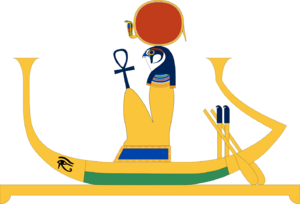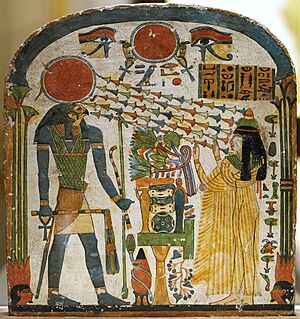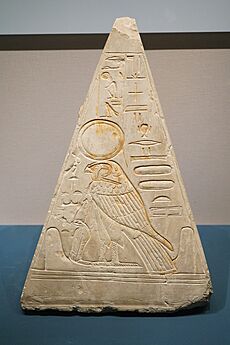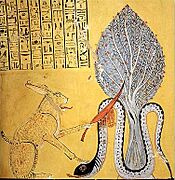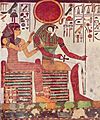Ra facts for kids
Quick facts for kids Ra |
|
|---|---|
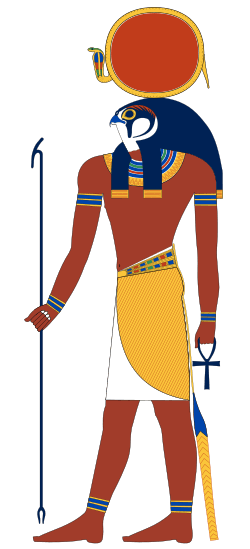
|
|
| Major cult center | Heliopolis, but he was worshipped all over Ancient Egypt. |
| Symbol | Sun Disk |
| Personal information | |
| Consort | Hathor, Sekhmet, Bastet, Satet (in some myths) |
| Offspring | Shu, Tefnut, Hathor, Sekhmet, Mafdet, Bastet, Satet, Anhur, Ma'at, Mut, Anat, Qetesh |
| Parents | None (in most stories) Khnum and Neith (in other stories) Hathor (in the cycle of rebirth) Mehet-Weret (in some stories) |
| Siblings | Apep, Sobek and Serket (as son of Khnum and Neith) |
| Equivalents | |
| Greek equivalent | Helios |
Ra (also spelled Re) was the ancient Egyptian god of the Sun. Around 2500 BC, during the Fifth Dynasty, he became one of the most important gods in ancient Egyptian religion. People believed he was especially connected to the Sun at noon.
The Egyptians thought Ra ruled over the sky, the Earth, and the underworld. The underworld was a dark place called the Duat. They also believed Ra was the very first pharaoh of Egypt. He was known as the god of the Sun, order, kings, and the sky.
Ra was often shown as a falcon, much like the sky-god Horus. Sometimes, these two gods were combined. This new god was called Ra-Horakhty, meaning "Ra, who is Horus of the Two Horizons." Later, during Egypt's New Kingdom, the powerful god Amun joined with Ra to become Amun-Ra.
The Egyptians believed Ra created all forms of life. Some stories say that humans were made from Ra's tears and sweat. Because of this, Egyptians sometimes called themselves the "Cattle of Ra."
Contents
Ra's Amazing Journey
Sailing Across the Sky
Ancient Egyptian myths say that Ra grew old and tired of ruling on Earth. So, he went up to the skies. As the Sun god, his main job was to carry the Sun across the sky every day. He did this in his special boat, known as a solar barque.
When the sun set, Ra and his boat would enter the akhet, or the horizon. Then, they would travel to the underworld. There, he sailed on an underground Nile River. He passed through twelve gates, one for each hour of the night. During this journey, he would change into a ram-headed god.
Every night, a giant serpent god of chaos named Apep would attack Ra's boat. Apep tried to stop the sun from rising again. After defeating Apep, Ra would leave the underworld. He would then rise at dawn, bringing light to the world for another day.
The Sun as a Creator God

The Sun gives life to all things, helping crops grow. Because of this, Egyptians worshipped the Sun as a god. Ra, as the Sun, represented life, warmth, and growth. He was seen as the creator of the universe and the source of all life.
This made Ra one of the most worshipped gods in Egypt. Many people considered him the King of the Gods. His worship spread across the entire country.
At the beginning of time, there was only a watery chaos called Nun. A pyramid-shaped mound, the Benben, rose out of the water. A lotus flower grew on the mound, and when it bloomed, Ra emerged. He then created Shu, the god of air, and Tefnut, the goddess of moisture. Ra was believed to have created all living things just by speaking their secret names.
How Ra Was Pictured
Ra was shown in many different ways. His most common form was a man with the head of a falcon. On his head, he wore a solar disc with a cobra wrapped around it. This cobra represented the Eye of Ra, a symbol of his great power.
Other forms of Ra included:
- A man with the head of a beetle (as the god Khepri, representing the morning sun).
- A man with the head of a ram (when he traveled through the underworld at night).
- He was also sometimes shown as a full-bodied ram, beetle, phoenix, serpent, or lion.
In some stories, Ra is described as an old king. His skin was said to be gold, his bones silver, and his hair a deep blue stone called lapis lazuli.
Worship of Ra
The main center for Ra's worship was the city of Heliopolis. This name means "Sun City." In Heliopolis, Ra was connected with the local sun god Atum.
Ra's popularity grew around the Second Dynasty. By the Fourth Dynasty, pharaohs were called "Sons of Ra." This was because people believed they were Ra's representatives on Earth. His worship became very important in the Fifth Dynasty. During this time, he became the official god of the state. Pharaohs built special sun temples, pyramids, and obelisks to honor him.
During the Middle Kingdom, Ra was often combined with other major gods. These included Amun and Osiris. By the New Kingdom, his worship was even grander. The walls of tombs were covered with detailed texts and pictures. These showed Ra's journey through the underworld. People believed Ra carried their prayers with the souls of the dead on his sun boat.
The worship of Ra and other Egyptian gods ended when Christianity became the main religion in Egypt.
Ra's Relationship with Other Gods
Gods Merged with Ra
Like many Egyptian gods, Ra was often combined with other gods. This created a new, single god.
Amun-Ra
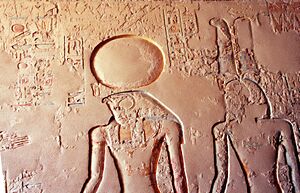
Amun was a creator god from the city of Thebes. As the worship of Amun and Ra grew, they were joined together. This created Amun-Ra, a solar creator god. This likely happened during the New Kingdom. It helped unite the people of Egypt under one main god. Amun-Ra was called the "King of the Gods."
Ra-Horakhty
Ra-Horakhty was more of a title than a separate god. It means "Ra, who is Horus of the Horizons." This connected Ra with Horus as the god of the rising sun. It represented the sun's daily journey from one horizon to the other. It also symbolized hope and rebirth.
Khepri and Khnum
Khepri was a scarab beetle god. He represented the morning sun. He was seen as a form of Ra at sunrise. Khnum, a ram-headed god, was seen as the evening form of Ra. With Khepri as the morning sun and Khnum as the evening sun, Ra himself often represented the powerful midday sun.
Gods Created by Ra
Many myths say that Ra created most of the other Egyptian gods.
Sekhmet
Sekhmet is a daughter of Ra. She is often shown as a lioness. She was known as an "eye of Ra" and acted as his tool for punishment. In one myth, Ra sent her to punish humans for plotting against him. She became so destructive that Ra had to trick her. He made her drink red-colored beer, which she thought was blood. She became calm, saving humanity.
Hathor
Hathor is another one of Ra's daughters. She was also sent as an "eye of Ra" to punish humans. However, she could also be a gentle goddess. In one story, Ra was very sad. Hathor danced in front of him until he laughed and felt better.
Bastet
Bastet, often shown as a cat, is another daughter of Ra. She is sometimes called the "cat of Ra." In myths, she protects Ra by cutting off the head of his enemy, the serpent Apep.
Ra's Main Enemy
Apep, also known as Apophis, was the god of chaos and Ra's greatest enemy. He was a giant serpent who lived in the underworld. Every night, Apep would try to swallow Ra's sun boat. He wanted to bring eternal darkness to the world. Ra, helped by other gods like Set and Bastet, had to defeat Apep every night. This allowed the sun to rise again.
Images for kids
-
The spirit (or ba) of Ra shown as a ram-headed falcon.
-
Ra-Horakhty was depicted like Horus, but wearing a sun disk instead of a crown. Today, Ra is often shown this way.
-
While in the underworld, Ra (as Khnum-Ra) was shown with the head of a ram and a sun disk.
-
A sculpture of Pharaoh Thutmose III with the god Montu-Ra (with a falcon head) and the goddess Hathor.
See also
 In Spanish: Ra (mitología) para niños
In Spanish: Ra (mitología) para niños
- List of solar deities
- Solar myths
- Teka-her


